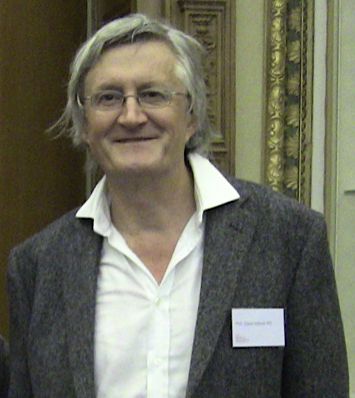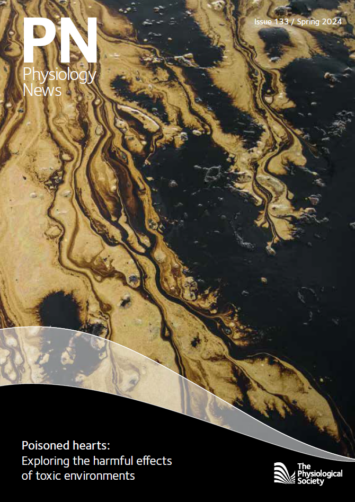
Physiology News Magazine
President’s view: My second year of presidency
Reviewing our activities and looking ahead at things to come
Introduction
President’s view: My second year of presidency
Reviewing our activities and looking ahead at things to come
Introduction

Professor David Attwell
President, The Physiological Society
Now, in the second year of my presidency, it is a good time to review events within The Society since I last wrote in August 2023, and outline what is coming up in the near future.
Climate Change and The Physiological Society
Life as we know it, and specifically physiology, may be on the brink of serious change. It was just announced that, for the first time on record, global warming has exceeded 1.5oC over the last 12 months, the Greenland ice sheet lost nearly 200 billion tons of ice last year, and water flow in the so-called Atlantic meridional overturning circulation (which includes the Gulf Stream that keeps the UK warmer than it would be otherwise) may be on the threshold of breaking down. It is thus with impeccable timing that The Society has (with the Faculty of Public Health) recently presented a report to Parliament on Climate Change and Physiology (including useful guidance on the best way to stay cool when the thermometer hits 40oC). The report is available here: www.physoc.org/heatresilience.
In mid-February, we held an online meeting with Wellcome on the link between extreme heat and mental health, and work on physiology in extreme environments (as we may experience in future!) has been recognised by The Society awarding its first Excellence in Physiology award to the Extreme Environments Laboratory at the University of Portsmouth (www.physoc.org/about-us/excellence-in-physiology/excellence-in-physiology-award/).
Awareness of the link between human activity and climate change is pushing many organisations, including The Physiological Society, to revise their arrangements for committee meetings in order to become more environmentally sustainable by reducing travel and unnecessary CO2 emissions.
Publications
In line with our environmental sustainability policy, and to reduce costs, the Board of Trustees have decided that Physiology News will move to purely online publication. Its structure will also be reorganised to give members an enhanced experience (see News and Views section for more information).
Experimental Physiology has now flipped to completely Open Access publication, and we are anticipating an increase in submissions after an initial dip, which we are told always accompanies such a flip.
For The Journal of Physiology, the major event on the horizon is the re-negotiation of our publishing contract with Wiley for the period after 2026. Given that this journal serves as the primary income stream for The Society, the pivotal decision of whether to continue with Wiley or explore alternative publishers hinges largely on the potential profitability we can secure through negotiation.
Raising awareness of Physiology
In November 2023, we celebrated Physiology Week, coordinating events involving hundreds of people all over the world. See www.physoc.org/physiologyweek/ and watch our video www.youtube.com/watch?v=jpxkxuhgqQU to see a few highlights of the events.
We also unveiled the latest in our series of Blue Plaques that commemorate important physiologists, with the aim of bringing them to the attention of the local population. In September 2023, we visited Newcastle University to unveil a blue plaque that commemorates Francis Arthur Bainbridge who demonstrated how the amount of blood flowing into the heart controls the heart rate.
Training events
The Society unveiled a new online Training Hub (www.physoc.org/training-hub/) as a benefit for members, with videos and resources on a number of topics that are essential for teaching physiology. I was impressed to learn some novel concepts in cardiovascular physiology from the first video I looked at, so I encourage you all to check out what is available there. The Training Hub also presented events on The Application of Stable Isotope Tracer Techniques in Human Physiological Research (at the University of Nottingham), an Introduction to Innovation and Intellectual Property (online), and two Research Project Management courses (online).
We have recently held two training events: Navigating your Career after a Postdoc (29 February, online); and Best Practice in in vivo Research (26 March, at the University of Bristol). The next one is our Physiology Education meeting in May at the University of Salford.
Scientific Meetings
The Society has had a series of successful meetings since last August. These included two-day meetings on Membrane Transport (University of St Andrews), Cross-Talk of Cells in the Heart (University of Liverpool), Regenerating the Cardiovascular System (University of Oxford), and Drowning Prevention and Treatment (online). Our annual Member Forum at the Royal Society gave members the chance to ask The Society’s Trustees questions about the way The Society and its journals are being run, and included a fascinating Presidential Lecture and question-and-answer session by Sir Jeremy Farrar (now Chief Scientist of the World Health Organization, and previously Director of the Wellcome Trust) on the practical politics of influencing science funding and government policy.
Across 2024, we have our largest ever programme of two-day meetings. The first of these on Dietary Manipulations for Health and Disease was held in March at Manchester Metropolitan University. We are looking forward to the next ones: Neuroplasticity in Brain Health and Disease (April, Newcastle University) and Regulation of Smooth Muscle Function (June, Dundalk Institute of Technology, Ireland). For a full list of events across the year please visit www.physoc.org/events.
The highlight of the year will be our Annual Meeting with the Scandinavian Physiological Society, at Northumbria University in Newcastle on 2–4 July, for which the registration period and abstract submission are now open. With seven plenary and keynote lectures, and a broad range of symposia, and oral and poster sessions, the programme looks outstanding. I hope to meet as many of you there as possible!
